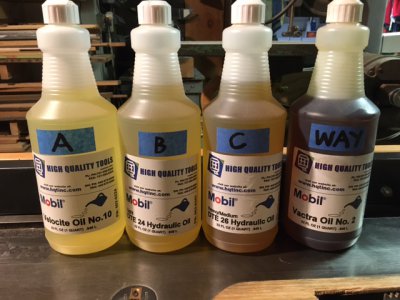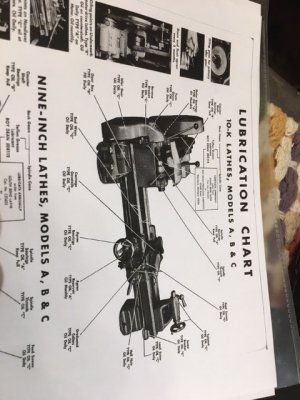Vactra #2 conforms to the ISO68 standard as do all others which are ISO68, it is a 20w oil that doesn't attack yellow metals like brass or bronze.
Mobil Vactra Oil Numbered Series
I use tractor oil from VP on my lathe for everything, it is a 20w oil that doesn't attack yellow metals and costs $30 for a 5 gal pail. It conforms to the obsolete John Deere J20A spec for hydraulic equipment. It's plenty good for my application.
VP Racing Fuels J20A Plus Utility Tractor Fluid, 5 gal., VP2040014 at Tractor Supply Co.
Reality is we're not pushing these machines hard in a hobby shop and they aren't running 16 hrs a day like in a production environment. When I was fixing up my Seneca Falls Star I bought some "special" oils but it felt kinda funny being particular about oil for a hundred year old lathe.
When I got my Bolton I did some research and decided to go with the cheapest 20w oil I could get from a reputable supplier that was designed for old gearboxes which have brass or bronze in them. I'm comfortable with my choice and am happy that I can change out the oil more frequently if I want. I also use it for general purpose lubricant since I don't want to have 12 different oil cans to keep track of. I used to be a VP racing fuel dealer so I'm pretty confident with their ability to formulate quality products.
My background? I built championship winning 4 stroke go kart motors that sold for thousands of dollars to racers around the world. So, I've seen what oil failures look like and know a little about how to prevent them. FWIW, my recommendation to racers was always to use the right amount of oil and change it frequently. Having it there and clean was way more important than the particular brand. I did see some failures related to switching between different types of synthetic oils and when I figured it out I started using Valvoline conventional 50w for dyno runs/break-in.
So, use whatever the manufacturer recommends but realize things may have changed in 50 or 100 years. One thing that hasn't changed though is manufacturers "recommending" specific products that they have a financial interest in. Why do you think my Cadillac has a "Mobil Synthetic 5w20" logo on the oil cap? Me thinks Mobil has been paying manufacturers to recommend their products for a long time.
JMHO, YMMV, etc, etc....
John




